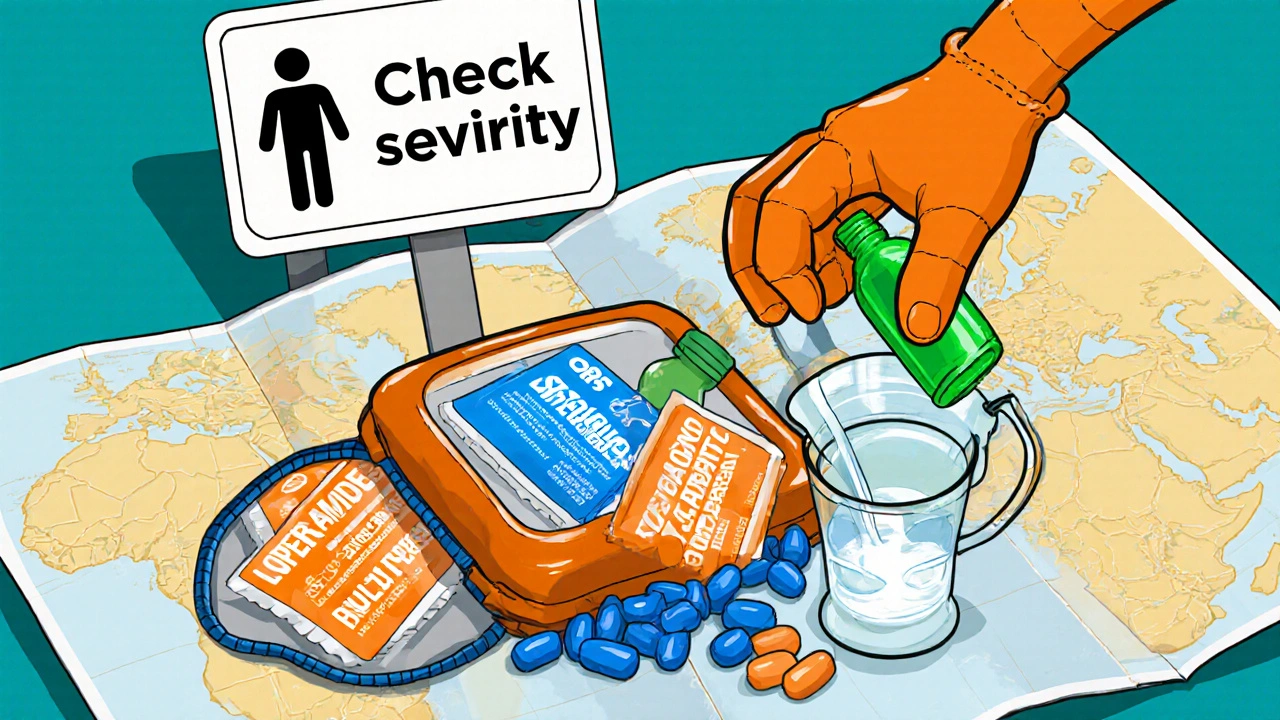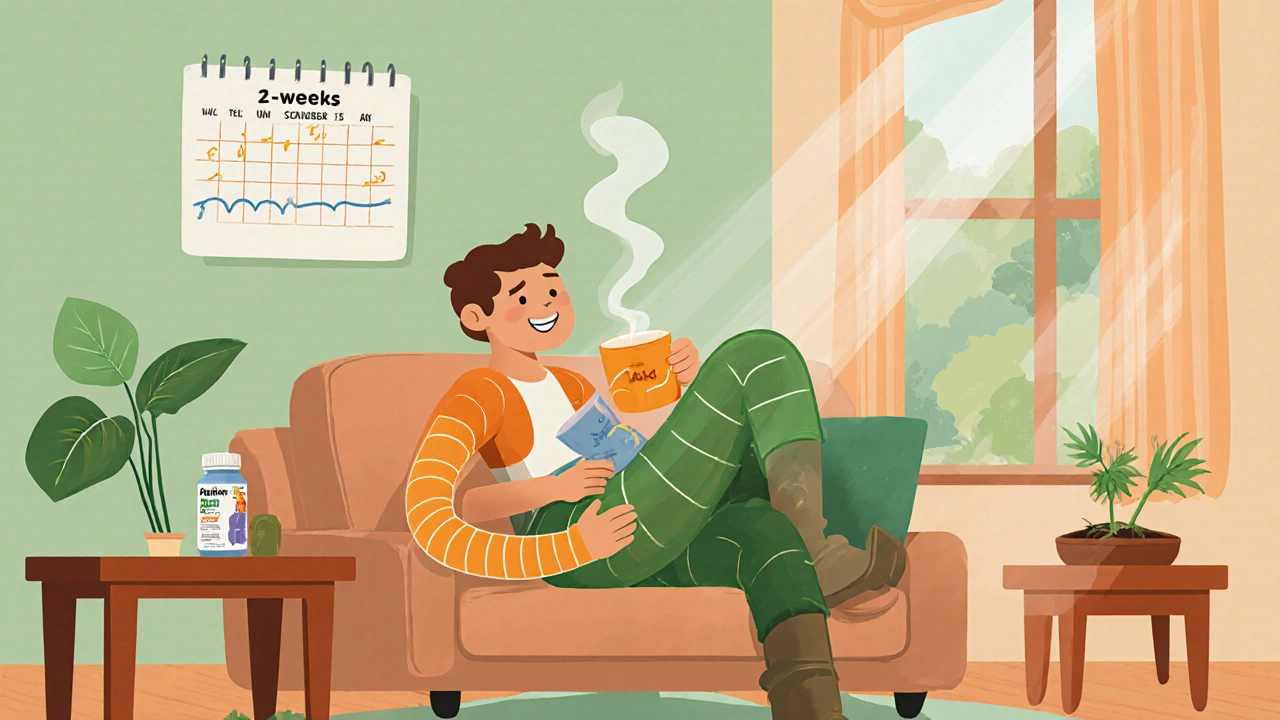Managing Acute Diarrhea on Long-Distance Trips: A Practical Guide

Oct, 15 2025
ORS Calculator
Calculate Your Homemade ORS
The World Health Organization recommends this ratio: 1 liter water with 6 teaspoons sugar and 0.5 teaspoons salt for effective rehydration.
Your ORS Recipe
For 0 liters:
- Sugar: 0 teaspoons
- Salt: 0 teaspoons
Important: Use clean water only. If water is questionable, add water purification tablets before preparing ORS. Never use regular table salt; use fine salt or salt with iodine.
When you’re on a marathon train ride, a cross‑continent flight, or a road‑trip that feels endless, the last thing you want is a sudden stomach upset that forces you into a bathroom every few minutes. Acute diarrhea can turn a dream adventure into a nightmare in minutes, but the right plan lets you stay on track and keep your health in check.
What Triggers Acute Diarrhea While Traveling?
Acute Diarrhea is a rapid onset of loose stools lasting less than two weeks, often caused by ingesting contaminated food or water. The most common culprits are Enterotoxigenic Escherichia coli, Salmonella, and Giardia. Even when you’re vigilant, a stray street‑food stall or a tap water sip can introduce thousands of microbes.
Other triggers include sudden changes in diet, stress, and medication side‑effects (especially antibiotics). In long‑haul journeys, the combination of fatigue and limited access to clean facilities raises the risk.
Immediate Steps to Take When Symptoms Appear
Speed matters. Follow this three‑phase response as soon as you feel the first cramps or urgency:
- Hydrate wisely. Swap sugary sodas for a homemade oral rehydration solution (ORS). Mix 1 liter of clean water with six teaspoons of sugar and half a teaspoon of salt. The balance restores electrolytes and prevents dehydration.
- Control the stool frequency. Over‑the‑counter Loperamide (Imodium) can reduce the number of stools for non‑bloody, non‑feverish cases. Take the initial 2mg dose, then 2mg after each loose stool, up to 8mg per day.
- Assess severity. If you develop a fever over 38.5°C, blood in stools, or signs of dehydration (dry mouth, dizziness, little urine), it’s time to seek medical help.
Essential Items to Pack for Diarrhea Preparedness
Think of your travel medical kit as a miniature clinic. Include these proven items:
- Oral Rehydration Salts (ORS) packets - a few sachets take up almost no space.
- Loperamide capsules - 2mg tablets, 12‑pack.
- Bismuth Subsalicylate (Pepto‑Bismol) - useful for nausea and mild bacterial infections.
- Broad‑spectrum antibiotic (e.g., single‑dose azithromycin 1g) - only if recommended by a doctor, and you have a prescription.
- Probiotic capsules - strains like Lactobacillus rhamnosus GG help restore gut flora.
- Water purification tablets or a portable filter - essential for making tap water safe.
Keep everything in a zip‑lock bag, labeled, and stored away from heat.

Food and Water Safety Rules That Cut the Risk
The best defense is prevention. Apply these simple guidelines:
- Drink only bottled water with sealed caps, or treat water with chlorine dioxide tablets (follow the 30‑minute wait rule).
- Avoid ice cubes unless you know the water source is safe.
- Eat foods that are hot, freshly cooked, and served on the spot. Skip salads, unpeeled fruit, and street‑vendor sauces unless you can verify cleanliness.
- Peel fruits yourself or buy pre‑packaged, sealed options.
- Hand‑wash with soap and clean water before meals; hand sanitizer (≥60% alcohol) is a solid backup.
When to Seek Professional Medical Help
Most traveler’s diarrhea resolves within 48-72hours with self‑care. However, certain red flags demand urgent attention:
| Symptom | Why It Matters | Typical Action |
|---|---|---|
| High fever (>38.5°C) | Suggests invasive bacterial infection | Visit local clinic or hospital; consider antibiotics |
| Blood or mucus in stool | Indicates possible dysentery | Urgent evaluation; stool culture if possible |
| Severe dehydration (dry mouth, dizziness, <2mL/kg/hr urine output) | Risk of electrolyte imbalance, kidney injury | IV fluids or advanced oral rehydration under supervision |
| Symptoms persisting >5days | May be a chronic infection or parasite | Full diagnostic work‑up, possible antiparasitic treatment |
In many countries, travel clinics offer rapid tests and same‑day prescription services. Keep the clinic’s address saved offline in case connectivity drops.

Post‑Travel Follow‑Up and Gut Recovery
Even after you’ve made it back home, the gut can stay a bit out of balance. Follow these steps to get back to normal:
- Continue a gentle probiotic for another 2‑3weeks.
- Re‑introduce fiber slowly - start with cooked veggies, then raw fruit.
- Avoid alcohol and caffeine for a week, as they can irritate the lining.
- If you notice lingering abdominal pain or irregular stools beyond two weeks, book a follow‑up with your GP. They may order a stool PCR panel to rule out hidden pathogens.
Most travelers report feeling fully recovered within a month, especially when they give the gut time to heal.
Frequently Asked Questions
Can I take antibiotics without a prescription while traveling?
Not advisable. Using antibiotics without a proper diagnosis can mask symptoms, promote resistance, and cause side‑effects. If you live in a country where a travel‑health doctor can provide a pre‑travel prescription, bring it along for emergencies.
Is it safe to use loperamide if I have a fever?
No. Loperamide slows intestinal movement, which can trap bacteria and toxins when a fever indicates a systemic infection. Seek medical advice instead.
How much ORS should I drink per day?
Aim for 1‑2liters per day, adjusted for activity level and climate. Each 250ml cup should contain the standard 6g sugar and 2.5g salt mixture.
Do probiotics help during an active bout of diarrhea?
They can shorten the duration of mild cases, especially strains like Saccharomyces boulardii. However, they are not a substitute for rehydration or anti‑diarrheal meds.
What’s the difference between loperamide and bismuth subsalicylate?
Loperamide slows gut motility quickly, ideal for frequent loose stools. Bismuth subsalicylate coats the lining, reduces inflammation, and can kill some bacteria, but works slower. Many travelers rotate them for combined effect.
